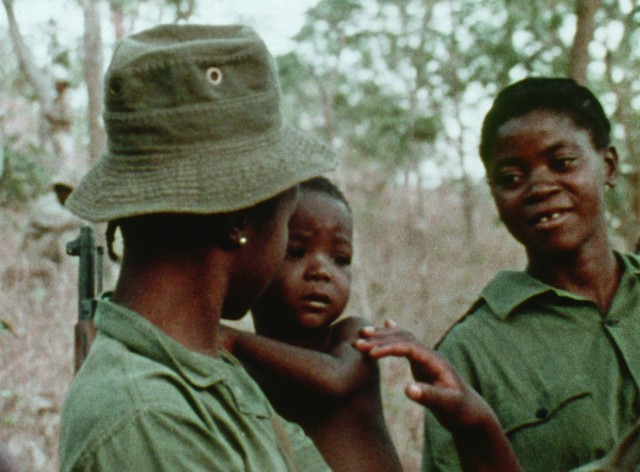Film Review: Concerning Violence
By Tola Ositelu
Dogwoof Productions and Scandinavian filmmaker Goran Hugo Olsson present ‘Concerning Violence’, a sobering look at the anti-colonial struggle across various African nations in the latter part of the 20th Century. The film is also a tribute to anti-colonialist writer Frantz Fanon, a member of the Martinican elite who discovered, on travelling to France, that he was afforded no special privileges, or even equal status, by the colonial masters. Fanon was forever scarred by this rude awakening. He believed that, faced with such a formidable and unfeeling foe, the only effective method for those involved in decolonisation movements was armed resistance. Fanon’s words are provocative, impassioned, uncompromising and at times even prescient.

With the help of graphic archive footage, a variety of Lusophone, Anglophone and Francophone former African colonies serve as case studies in the war against colonial oppression. The narration (courtesy of Lauryn Hill) is comprised wholly of incendiary excerpts from Fanon’s ‘The Wretched of the Earth’. Interspersed throughout are interviews with well-known leaders of these counter-Imperialist movements, as well as the anonymous foot soldiers and the settlers, ensconced in white entitlement, from whom they were resisting.
It’s quite a feat not to be overcome by a simmering rage, witnessing imperialism laid bear with such brutal frankness. We know that the story of colonial injustice is nothing new, but confronted by the stark reality of the human cost (a young mother and her suckling baby with their limbs freshly blown off for example), these images appal and anger afresh.
‘Concerning Violence’ also features interviews with the likes of Mugabe and other African leaders of ill-repute, during the height of indigenous military resistance. It is a subtly grim reminder that those formerly oppressed, once in power, too often create a new elite and in turn oppress. It’s also a reminder that we as Africans have agency and are not merely the benighted victims of a superior power. The far reaching deleterious effects of colonialism in many, if not most, cases would not have been possible without the complicity of a ruling class that antedated the arrival of Western imperialists. As Africans, to constantly regard ourselves as victims without acknowledging the culpability of self-serving individuals is to unconsciously imbibe another sinister ideology; that of infantilisation. This is an observation that is notably absent, at least from the excerpts of Fanon that have been selected. It is not ascertained whether this is indicative of his writing (with which I’m otherwise not very familiar) or whether, being European, Olsson is treading carefully vis-a-vis calling out culprits. Thankfully the brief footage of forward-thinking Burkinabe revolutionary, Thomas Sankara (himself slain in his prime by one of his compatriots, supported by the US government) provides some nuance.
The presence of Christianity in Africa is predictably, and rather tiresomely, vilified as an alien religion imported from Europe and forced upon blissfully animistic peoples. This of course conveniently ignores the dark aspects of these traditions that certain missionaries sought to redress (such as the slaughtering of twins because they were perceived as being innately evil); or the fact that some of the earliest churches were established in the East of the continent many centuries before the advent of colonialism or even before Christianity made any proper inroads into Europe.
Fanon’s commentary seems to be mainly based on his exposure to French imperialism which was, by all accounts, different from how the British ruled their colonies for instance. Although the impact of colonialism was without exception largely pernicious, experiences varied. Depending on the region, not all of the indigenous population came into regular contact – if at all – with European settlers. Not all suffered the indignations described in the film.
As a pacifist, I am conflicted about Fanon’s unmitigated support of violent resistance. Its short term efficacy and the ire that motivates it are historically justified. The colonial powers didn’t use fair means to obtain their objectives (these almost invariably being unjust in and of themselves) therefore what is the use of being reasonable and genteel when reclaiming Independence? The problem is that once liberation is secured, this violence has tended to mutate into internecine fighting. Militancy engenders a culture of violence, a scourge from which many post-colonial states still suffer. In the scramble for power and resources, compatriots turn their weapons on the very people that they, or their forebears, once fought to defend from oppressive external forces.
Without question colonial exploits wrought profound havoc across the African continent. In several ways they still do. However we cannot go on indefinitely blaming colonial aftermath for our own failings.
UPDATED WITH SCREENING DATE/LOCATIONS:
The Mosiac Rooms, London, UK on March 25th 2015.
Rough Trade Nottingham, Nottingham, UK on March 31st 2015.
Madiba Harlem at My Image Studios, New York, US on April 12th 2015.


